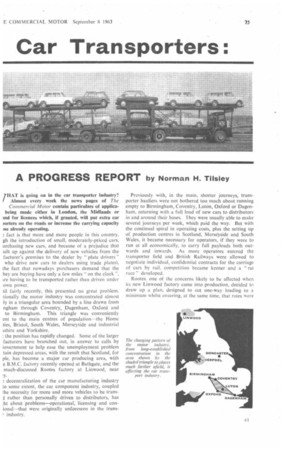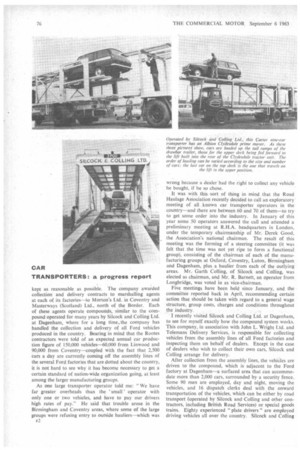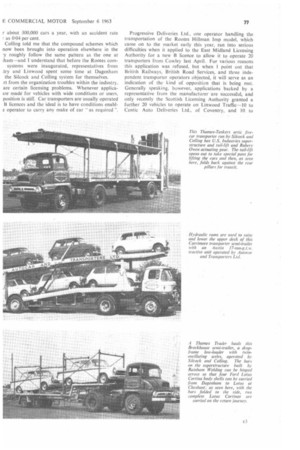Car Transporters
Page 77

Page 78

Page 79

If you've noticed an error in this article please click here to report it so we can fix it.
A PROGRESS REPORT by Norman H. Tilsiey THAT is going on in the car transporter industry? I Almost every week the news pages of The Commercial Motor contain particulars of applicabeing made either in London, the Midlands or md for licences which,. if granted, will put extra car mrters on the roads or increase the carrying capacity ise already operating.
3 fact is that more and more people in this country, gh the introduction of small, moderately-priced cars, urchasing new cars, and because of a prejudice that uilt up against the delivery of new vehicles from the facturer's premises to the dealer by " plate drivers" who drive new cars to dealers using trade plates), the fact that nowadays purchasers demand that the hey are buying have only a few miles "on the clock ". ire having to be transported rather than driven under own power.
til fairly recently, this presented no great problem. tionally the motor industry was concentrated almost ly in a triangular area bounded by a line drawn from ngham through Coventry, Dagenham, Oxford and to Birmingham. This triangle was conveniently 2nt to the main centres of population—the Home ties, Bristol, South Wales, Merseyside and industrial ashire and Yorkshire.
the position has rapidly changed. Some of the larger facturers have branched out, in answer to calls by lovernment to help ease the unemployment problem tam n depressed areas, with the result that Scotland, for plc, has become a major car producing area, with e B.M factory recently opened at Bathgate, and the much-discussed Rootes factory at Linwood, near :y.
decentralization of the car manufacturing industry to some extent, the car component industry, coupled he necessity for more and more vehicles to be transrather than personally driven to distributors, has ;ht about problems—operational,' licensing and conional—that were originally unforeseen in the transindustry.
Previously with, in the main, shorter journeys, transporter hauliers were not bothered too much about running empty to Birmingham, Coventry, Luton, Oxford or Dagenham, returning with a full load of new cars to distributors in and around their bases. They were usually able to make several journeys per week, which paid the way. But with the continual spiral in operating costs, plus the setting up of production centres in Scotland, Merseyside and South Wales, it became necessary for operators, if they were to run at all economically, to carry full payloads both outwards and inwards. As more operators entered the transporter field and British Railways were allowed to negotiate individual, confidential contracts for the carriage of cars by rail, competition became keener and a "rat race" developed.
Rootes. one of the concerns likely to be affected when its new Linwood factory came into production, decided to draw up a plan, designed to cut one-way loading to a minimum whilst ensuring, at the same time, that rates were kept as reasonable as possible. The company awarded collection and delivery contracts to marshalling agents at each of its factories—to Morton's Ltd. in Coventry and Masterways (Scotland) Ltd., north of the Border. Each of these agents operate compounds, similar to the compound operated for many years by Silcock and Coiling Ltd. at Dagenham, where for a long time.the company has handled the collection and delivery of all Ford vehicles produced in the country. Bearing in mind that the Rootes contractors were told of an expected annual car production figure of 150,000 vehicles-60,000 from Linwood and 90,000 from Coventry—coupled with the fact that 2,500 cars a day are currently coming off the assembly lines of the several Ford factories that are dotted about the country, it is not hard to see why it has become necessary to get a certain standard of nation-wide organization going, at least among the larger manufacturing groups.
As one large transporter operator told me: "We have far greater overheads than the ' small ' operator with only one or two vehicles, and have to pay our drivers high rates of pay." He said that trouble arose in the Birmingham and Coventry areas, where some of the large groups were refusing entry to outside hauliers—which was wrong because a dealer had the right to collect any vehicle he bought, if he so chose.
It was with this sort of thing in mind that the Road Haulage Association recently decided to call an exploratory meeting of all known car transporter operators in the country—and there are between 60 and 70 of them—to try to get some order into the industry. In January of this year some 50 operators answered the call and attended a preliminary meeting at R.H.A. headquarters in London, under the temporary chairmanship of Mr. Derek Good, the Association's national chairman. The result of this meeting was the forming of a steering committee (it was felt that the time was not yet ripe to form a functional group), consisting of the chairman of each of the manufacturing groups at Oxford, Coventry, Luton, Birmingham and Dagenham, plus a haulier from each of the outlying areas. Mr. Garth Coiling, of Silcock and Coiling, was elected as chairman, and Mr. R. Barnett, an operator from Longbridge, was voted in as vice-chairman.
Five meetings have been held since January, and the committee reported back in April, recommending certain action that should be taken with regard to a general wage structure, group costs, charges and conditions throughout the industry.
I recently visited Silcock and Coiling Ltd. at Dagenham, to see for myself exactly how the compound system works. This company, in association with John L. Wright Ltd. and Tolemans Delivery Services, is responsible for collecting vehicles from the assembly lines of all Ford factories and inspecting them on behalf of dealers. Except in the case of dealers who wish to collect their own cars, Silcock and Coiling arrange for delivery.
After collection from the assembly lines, the vehicles are driven to the compound, which is adjacent to the Ford factory at Dagenham—a surfaced area that can accommodate more than 2,000 cars, surrounded by a security fence. Some 90 men are employed, day and night, moving the vehicles, and 16 dispatch clerks deal with the onward transportation of the vehicles, which can be either by road transport (operated by Silcock and Coiling and other contractors, including British Road Services) or special goods trains. Eighty experienced "plate drivers" are employed driving vehicles all over the country. Silcock and Coiling
r about 300,000 cars a year, with an accident rate r as 0-04 per cent.
Coiling told me that the compound schemes which now been brought into operation elsewhere in the 'y roughly follow the same pattern as the one at [ham—and I understand that before the Rootes corn systems were inaugurated, representatives from try and Linwood spent some time at Dagenham the Silcock and Coiling system for themselves.
rt from the organization troubles within the industry, are certain licensing problems. Whenever applicaire made for vehicles with wide conditions or users, position is stiff. Car transporters are usually operated B licences and the ideal is to have conditions enable. operator to carry any make of car as required
Progressive Deliveries Ltd., one operator handling the transportation of the Rootes Hillman Imp model, which came on to the market early this year, ran into serious difficulties when it applied to the East Midland Licensing Authority for a new B licence to allow it to operate 20 transporters from Cowley last April. For various reasons this application was refused, but when I point out that British Railways, British Road Services, and three independent transporter operators objected, it will serve as an indication of the kind of opposition that is being met. Generally speaking, however, applications backed by a representative from the manufacturer are successful, and only recently the Scottish Licensing Authority granted a further 20 vehicles to operate on Linwood Traffic-10 to Centic Auto Deliveries Ltd., of Coventry, and 10 to
































































































































































































